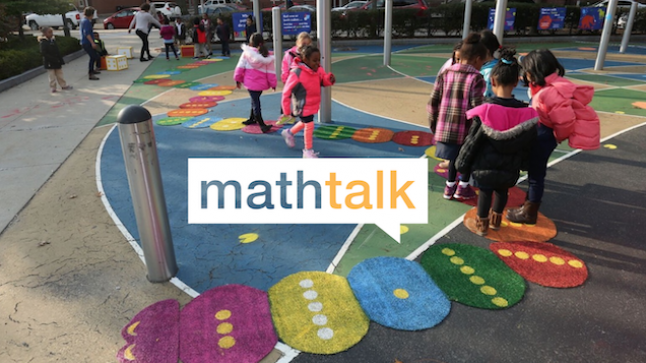Series: Hear from the Experts
MathTalk Leaders Illustrate How Efforts Can Transform Neighborhoods

Early Mathematics Learning in Family and Community Contexts was the 2019 topic of the Promising Math biennial conference. Framing the event were three plenary presentations that brought cognitive, contextual, and collaborative lenses to the topic. In the first presentation “Aha, See Math Everywhere,” Omo Moses and Keith Griffin of Cambridge, Massachusetts shared their grass-roots efforts, called MathTalk, to engage young children in mathematics in their own neighborhood.
Both Cambridge natives, Moses is the founder of MathTalk, a community-based educational technology lab, where Griffin works as a Family Engagement Leader focusing on product development. Griffin has raised six children in the neighborhood. Community connections are a big part of their story.
Moses started with some personal context, sharing that “growing up, math wasn’t my favorite thing to do, and math time with my dad wasn’t fun time.” It was after becoming a dad himself that he became interested in how he could do math with his young son. “I knew I wanted our relationship to be about learning, doing the things that we enjoy and we love doing. And so for me, math time happened when we were making breakfast…Math happened in the playground and math happened when we rode trains.” MathTalk grew out of his wish to help other families have fun with math in their everyday lives.
I knew I wanted our relationship to be about learning, doing the things that we enjoy and we love doing.
About MathTalk
Griffin became involved with MathTalk when he brought his young daughter to a weekend basketball program that Moses had created and was running. MathTalk flyers led to a conversation, where he began to see what the vision was. He exclaimed, “Man, I just got to be a part of this.”
As a long-time Cambridge resident and involved parent, Griffin was in a good position to help MathTalk reach out to families in the community. “Essentially what we did was think about…what are the locations, who are the people in the neighborhood, and how can we engage them in thinking about activating those spaces for early math learning?… So, we’re going to the bodega or the Puerto Rican restaurant and we’re having a conversation, saying ‘We want to begin to use your space to help kids learn math’.”
Both men emphasized how much of the process was truly collaborative – that is, community members were involved from the very beginning of the work. Moses reached out to folks at the local school district and got middle and high school students involved in the co-design process. People from housing and neighborhood organizations were also involved, and MathTalk managed to secure space at MIT to hold a “hack-a-thon.”
I grew up in close proximity to all this innovative stuff that’s happening that has global impact… but kids either don’t see it or don’t feel like they can access it.
“So what you see (in the video) are different images or stations… ideas of what we might want to do in a barbershop, what we might want to do at an eatery, things that we can install in a playground.” Essentially, the hack-a-thon participants took “ideas that got generated at the community level” and built on and extended them.
For Griffin, working on the ideas at MIT with other community members was “a wonderful experience.” He said it was powerful to be involved in the development of an idea, such as a children’s menu for a restaurant that has math ideas built in, and then have it later be actually installed and used in a public space. Part of the excitement of the opportunity came from finally being able to access MIT, an amazing local resource that had not previously been available to him. Moses commented that he “grew up in close proximity to all this innovative stuff that’s happening that has global impact… but kids either don’t see it or don’t feel like they can access it.” He hoped this kind of work would “help kids and parents at an early age have the types of experiences that will inspire them to access all these opportunities that they’re literally surrounded by.”
Last June, MathTalk “went live” in Cambridge, meaning multiple physical installations were put up throughout the neighborhood. A foot pattern was installed in the sidewalk on a corner at one of the housing projects, an Abacus was built on a playground, and a number line was set up in a city park. An app was created that pairs with all those locations and provides prompts, way-finding experiences, and even augmented reality experiences that give people ways to interact with the math. View it in action.
Griffin is clear that the work has made a difference. “When you see the kids smiling, that’s my gift. Seeing the people actually engaging and learning from our product.”
Promising Math 2019 welcomed over 100 attendees from across the United States. Participants included community organizers, math educators, early childhood specialists, researchers, parent leaders, policy makers, and librarians, to name a few. They offered presentations on a wide range of topics, including practices for engaging families, research on how contextual factors influence the early math learning of English learners, discussions of what “public math” is, and demonstrations of games and activities families can use to do math together in fun ways. The conference is funded by Heising-Simons Foundation.

Co-Design Process for Math in the Neighborhood with Omo Moses
Hear Omo Moses and Keith Griffin further discuss MathTalk and the co-design process of their neighborhood installations.